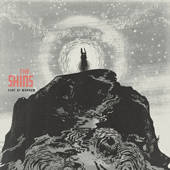
The Shins
Port of Morrow
(Columbia; 2012)
By Brent Ables | 4 May 2012
Some people say they see ghosts; I hear them. Specters of beings that once were spry, and whole, and alive. That filled their pockets with snails, only to let them go one by one all day. I don’t claim any supernatural powers—just listen to Port of Morrow and you can hear them too. Because you’ve heard these melodies before, and you’ve heard these choruses before. You’ve heard them on records named Oh, Inverted World (2001), Chutes Too Narrow (2003), and whatever that other one that I listened to twice was called (2007). And the difference between this record and and those two is as straightforward as the difference between the dummy advertising a dress in the store window and the woman who buys that dress and walks out the door wearing it. The baby and the stillborn it always could have been, but for the grace of life.
In his cogent, insightful review, Matt wrote about this record that Shins devotees “won’t care that it’s cliché, only that it’s the Shins.” Thus we (hi, recovering Shins devotee here) won’t have a problem, for example, with James Mercer’s usage of clichés about nostalgia and romance, and will enjoy “the formula” that is this record as it if were the very substance the formula signified. As much as I liked Matt’s review, I really have to take exception to this point. Because I love Inverted World with all the love in me and will still get high on Chutes Too Narrow when I’m 50, but: I care that this album is stacked with clichés. I care that Mercer’s singing sometimes sounds like “a parody of [his] own previously tight execution.” I care that this record is really just not very good at all, even if it also is not very bad.
What I want in an album, speaking generally, is entirely unclear to me; what I don’t want is a “formula” “remold[ed] for my enjoyment.” In fact, as music goes, I can’t think of anything I want less. Isn’t the music that really matters and resonates across time music that breaks the mold, and tells formulae to fuck their formulaic selves? Or maybe that’s just what I’m drawn to. In any case, I don’t want to hear the chorus of “Turn a Square” re-written as the chorus of a song called “Simple Song.” And it pains me to hear the classic “Young Pilgrims,” a song that elegantly invoked “A cold and wet November dawn,” re-imagined as a song called “September.” I don’t want anything to do with the Eagles-lite chorus of “40 Mark Strasse.” And I sure as hell don’t want to come in contact with Mercer’s attempt at an Ok Computer (1997) b-side, if that’s indeed what the title track is. These things feel false to me, precisely like clichés feel—redundant.
I don’t mean to harp on novelty as if it were the end-all criterion for evaluating this album. The Shins were never an especially original band, but acknowledging one’s influences—even wearing them on one’s sleeve—is an entirely different thing than recycling one’s own work. No, the Shins were great for some very old-fashioned reasons: they wrote incredible melodies, penned lyrics that were relatable yet abstract and creative, and put them together in neat little song-packages where every second counted and every note wanted to win you over. “Bait and Switch,” the best song on Port of Morrow, recaptures some of this eager, joyful glee; but in my opinion, the rest of the album holds none of these virtues.
The lyrics tend to veer between unwelcome attempts at imparting wisdom (“You have to lose all your childish notions”) and metaphors that are too busy reveling in their own convolution to make much sense. By the same token, Mercer’s melodies were once stunningly dextrous: listen to a song like “Caring is Creepy” and just marvel at the way he jumps around scales and octaves without it ever sounding laborious or busy. And sure, the melodies on this album jump around plenty, but the difference is precisely that they do sound overly busy. Forced. That chorus in “40 Mark Strasse,” as truly lame as I find it, still feels more honest somehow than Mercer’s aimless noodlings in the verses. As perverse as it sounds, it’s almost easier to like this album when it’s content to be boring.
And I think this hints at the larger truth about Port of Morrow: namely, that in its heart of hearts it’s a just-ok MOR rock record trying hard to sound ten years younger and spryer in order to recapture this band’s long-lost glory days. The album-length equivalent of a melancholy dad flipping through his high school yearbook at 4am. Perhaps Mercer even set out from the beginning harboring this secret, and formulated a strategy accordingly: maybe he too thought that those of us who didn’t shrug our way through Wincing the Night Away (2007) and snore our way through Broken Bells (2010) wouldn’t care that he was mostly just mining his own discography for inspiration here, but would care only that it’s the Shins. A decade ago, I too might’ve been content with that. But now, to me at least, James Mercer might as well be a ghost.





